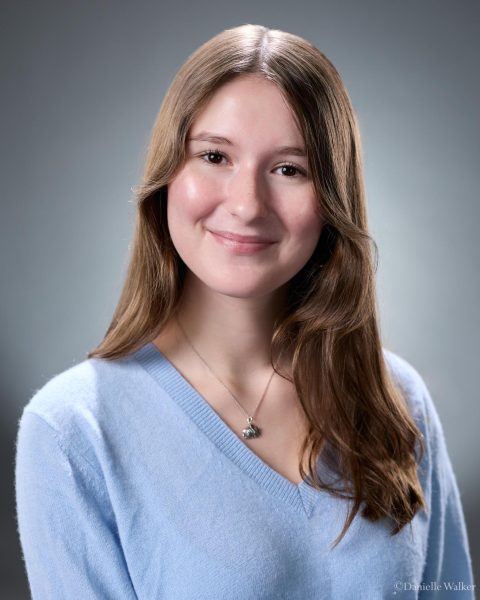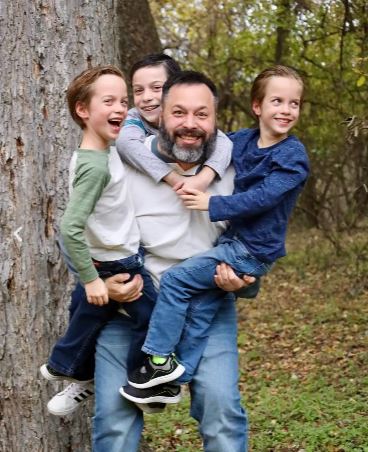
Q: Why are you running for the school board?
A: There are quite a few reasons. The first one is that in the past, I’ve felt like the current school board is can be very dismissive that a lot of times they’re very opinionated about issues, and they make those decisions on their own and I don’t feel like they make enough decisions with community input, or they decide that they know better than the community because they believe that they have more information and so they just move forward. And I’m somebody who believes in building communities. I’m also very, very against the Partisan divide at the local level. We shouldn’t be fighting between parties over education. Everybody wants their kids to have a great education and wants teachers happy in the classroom, doing a great job.
Q: So what past experiences make you qualify to be a school board member?
A: I was a teacher in Baltimore City for six years. I was a science department head while I was there. I wrote curriculum. I was a robotics coach. I founded the Baltimore City Vex Robotics League. I had a lot of experience working as a teacher representative, so I represented the teachers to the school board, to the principal. And I was actually a part of fighting for merit based pay in Baltimore City, and we ended up getting it, which was great for teachers. Teachers could make a lot more money based on their performance as teachers. Also, I’ve spent years as a program manager, so I’m used to working with large groups of people and accomplishing things with people who probably disagree with me at the beginning.
Q: How do you think your past experience as both a teacher and a robotics coach, like you mentioned, will translate into service on our school board?
A: So the first thing is, as both as a teacher and as a coach, right? Teachers obviously get paid, but we all know that teachers don’t get paid enough. Right? Their influence on our society is so huge. And as a robotics coach, I was a volunteer. Everything I did for the thousands of hours I spent setting up competitions, coaching other coaches, working with the kids on my team, I understand what it takes to make things work at the school level and at the school board level. Also, I had to deal with so many different people, right? I had to learn a lot of key things as a teacher, like how to de-escalate with someone who very much disagrees with you. I had experiences in some of the most difficult schools in the nation, where kids are at home dealing with things that you can’t even imagine and they come to school and they bring that with them. So I understand the frustrations of the students. I understand the frustrations of the teacher. And I’m a parent now, so I have the full experience of what it’s like for our kids in school here. Whether it’s dealing with bullying or with teachers who don’t have the support that they need to help our kids. All three of our children have been diagnosed with ADHD and anxiety. So I’m very, very familiar with that experience. In Baltimore City, I was a huge advocate for better school discipline policy that protected teachers and allowed students the opportunities they needed to do it, or to reach their highest level in the classroom. I also supported a lot of parents to the IEP and 504 process. So I’m very experienced end to end with the school districts and how they work.
Q: All right. Would you say you’re satisfied with Doctor Gearing’s job as a superintendent? Why or why not?
A: That’s a great question. I think that you should never be satisfied with a superintendent’s job. I think that there are a lot of things that Doctor Gearing has done right, and a lot of things that he could do better. I think we work with the people that we have, and Doctor Gearing is the best superintendent that we have now. And so, it’s not about job performance necessarily as much. It’s about working with that person to make sure we’re all going in the right direction. And I think that Doctor Gearing, even though we’ve clashed in the past on some things when I’ve talked to him, that he is someone who is willing to work with the people around him to accomplish what we need to do in this district.
Q: So I know you have three children who are currently LISD students. How are or was their experiences in the district and how do you feel this might impact your term on the school board should you win?
A: Wow, this is a great question. Okay, so short story. So all three kids have had mediocre to bad experiences with their struggles. So all three of them have struggled in reading and math. And I feel like there is not enough support for the teachers here to support students like that. So in a lot of cases, they get left behind. And in talking to other people in the district, this is the experience of a lot of people. And even if it wasn’t, even if it was, let’s say out of the 42,000 kids we have here, even if it was only 100 kids who had this experience, those hundred are worth us looking at our policies to make things better. My children have also experienced a lot of bullying, and when we reported it to the school, it felt like in a lot of cases there wasn’t a lot that they could do. And so, I am someone who is coming to the school board with humility saying, listen, this is something we need to solve for everyone. Why are there so many kids who are struggling, who are not being supported? And it’s not good enough to say that, oh, it’s bad teachers. You know, in general, there aren’t bad teachers, right? Bad teachers are few and far between. What you run into is that teachers who don’t have the support structure around them, people to give them constructive criticism, people to say, hey, maybe for this kid, you should try it differently. And it’s important that we give teachers the time that they need to do that. Right now, in talking to quite a few teachers in the district, teachers’ planning periods are filled with lots of meetings and other things that are non educational when they should be focused back on the students. And so one of the things that I’m hoping to bring to the school board, if I’m elected, is that we increase that teacher planning time, make sure that the teachers have what they need so they can support all of our students so they can mentor each other so they can exchange ideas. We need that space, that time, for them to do a great job for our students.
Q: What do you believe is the biggest challenge facing students today?
A: I would say lack of support. If we’re talking about educationally, I’d say that there’s so much information in the world, right? And students aren’t necessarily ready for that firehose. And a lot of times we just throw them out there, right? When my son was struggling in fifth grade, the teachers basically told him you’re not ready for sixth grade, you’re not prepared, you’re not this. And we see him for a few hours a day, right? We do everything we can with him. What are we doing to support those students? How are we implementing scaffolding for organizations for kids who struggle? On the flip side, non educationally. You know, there is a lot of issues in this district with how we treat our struggling students. You know, who goes where, how the discipline policy is applied evenly. You can see that we mirror a lot of the national averages for people of color and students that, those students are experiencing much more discipline, much more lower performance, much more struggles. And that is very difficult for the district as a whole. It puts a tax on us because those students are in the classrooms, and if they’re acting out, if they’re dealing with these struggles, then that impacts the class, right? And what we need to be doing is focusing on creating a student culture of support. The third thing for me is that, you know, it’s a tough thing to say, but we have problems with drugs in our schools and we need to find a solution. And that solution can’t be a pat on the back and don’t do drugs, right? We need to educate students. We need to understand how these things are getting into our schools and we need to find solutions that work for everyone. Not just saying like, don’t do that or we’re going to suspend you or expel you. Those types of consequences are usually not effective, because if you’re at that point where you’re struggling with drug addiction and you have nowhere else to go, what do you care if you get suspended or expelled? You know, that’s not going to help that child, in the end. They’re going to get sent out and it’s just going to be a vicious cycle for them.
Q: In your mind, what is the ideal take you want for an LISD graduate?
A: I would say I’m ready. I want our students to leave our district with the mentality that I’m ready for what comes next. I’m ready for college. I’m ready for trade school. I’m ready to become a barber, a hairstylist, to become an electrician. You know, I want our students to feel like when they leave the district, they have a rocket boost behind them that is sending them on to what they’re doing next, and that if they ever needed anything, that they could come back to this community and know that they’re supported. I also want them to have the take away that when you are working hard, that we see it and you are going to succeed. And I think that we have a lot of great values in this district. We have the ethical principles, we have our graduate profile, but I know as a student who is in a massive high school, my high school is 4000 students, you get lost really easily and you can finish this district and feel like you don’t fit in and you have no place to go. And I want our students to not feel the way that we want them to feel, but I want them to feel good about the way they are. Because you could graduate with the ten ethical principles, you could be an awesome citizen, be all these things, and still feel like you are a failure and like you have no idea what you’re going to do next.
Q: All right. Teachers’ pay is a significant issue. I know you’ve campaigned for merit based pay increases back when you were a representative in Baltimore, do you still stand by that? And how do you plan to address teacher pay in LISD going forward?
A: That is an excellent question. So I stand by that merit based pay, when done right, can increase teacher pay and it can increase the amount of buy-in that teachers have for classroom performance. I think that there is a massive struggle with our finances. The state doesn’t provide enough money to pay our teachers the way that we should. And the district has done a pretty middle of the road job of giving them raises, right? We have raises year after year after year, and we have probably the best raises that we can give. And at this point, I feel like we’re capping out on what we can pay for the whole district. So what we need to do is find better ways to bring money to teachers. I will tell you, as a former teacher, money is great, but I don’t think there’s enough money in the district to make teachers happy if they’re miserable at their jobs. Right? And it’s not fair that teachers can’t pay to live in our district. I’m not sure if that’s something I can solve in four years, right? I’m not going to get teachers from our current middle of the road, you know, 60, 55, 60,000 to 80,000 in four years. That money’s not going to come out of the air, but what we can do is start to focus on what we can do to support our teachers and our culture. I will always be for increasing teacher pay and implementing a better pay scale for our district, as long as that option is on the table while I’m on the board, as long as it’s financially viable, I think we should pay our teachers the maximum amount our district can afford at the expense of almost everything else. I also believe that we should be making sure that our teachers have the time, the support, the training, the mentorship that they need. When you have those things, you can more easily deal with the fact that the district can’t afford to pay you more, right? Lets say, we got a windfall of $200 million next year that we could just put towards teachers, that money is going to run out at some point. And if the state isn’t willing to fill it back up, we’re not going be able to support the teacher salaries in the future. We’re already running at a deficit, right? This year, $13 million. That money’s got to come from somewhere and it can’t come from teacher pay. We need to find other ways to lower expenses and increase teacher pay.
Q: So at least it has a long range planning committee tasked with making recommendations regarding the changing the size of the district, facilities and innovation academies. What do you think are the biggest priorities LISD should be considering in terms of long range planning?
A: I think that we should be looking at ways to allow parents who are willing to mobilize around our district. I think that we haven’t done enough to promote a transfer system that would allow parents to get out of schools that are overcrowded and drive their kids to a school on the way to work, right? I’ve heard from a lot of people that given the opportunity when they hear about things like in Steiner Ranch, where there is low, attendance, compared to other parts of the district, that they drive to Lakeway and they’d be happy to drop their kids off, but they don’t have those opportunities to transfer. I also have heard, from other people in our district, that it’s a lot better when we think about using our current facilities than it is about explosively expanding. We have proven over and over again that the projections from our demographers, they line up much higher than our district growth. And part of that is charter schools, private schools, homeschooling. That’s seen a major increase since COVID, but part of it is also that parents’ needs are not being met. And so they’re going to other places. They’re going to Round Rock or Lake Travis or other places like that, because they don’t feel like they can get the education that they need here. I think that in the long term, we need to build schools. We all know that, okay? But in the short term, we have to solve these problems in a community driven, financially viable way, a way that makes sense for our students, a way that makes sense for our teachers, in a way that makes sense for the budget.
Q: All right. On a related note, how do you believe you should go about facility optimization regarding schools with low enrollment?
A: I love that word. So little personal thing, so when I was working at Google, I mean, I am working at Google still, but, a little over a year ago, I received a layoff notice. And one of the things that hurts the most is that they changed it and they changed the conversation. They call it impacted, right? Because it hurts less. Lets say what it really is. Facility optimization is not just optimization. It’s closing schools. And we need to seriously discuss that. We need to, not because I believe we should be closing schools, I think we should keep all of our buildings open and we should be using them for education in one way or another. But what we need to look at is those two sides of optimization. The one that I just talked about, how are we transferring in students to schools that are low enrollment, so we can keep those schools full? And how are we using our facilities to the best possible way that we can? I think if we’re willing to close schools, we need to make it loud and clear that we’re considering it. I think that site based committees should have notification that we’re considering it. So that the community can have a conversation about it and bring up their issues with it. Now everyone’s going to be unhappy when a school closes, right? I’ve heard from constituents when they called me that they’re worried about their schools closing because they’re walkable. And I worry with them, right? We want a walkable community if we can have it. But the reality is that over a 200 square mile district, we’re going to lose that walkability at some point, right? We have 42,000 students now. That’s going to continue to increase. The more we increase, the harder it is to be to have walkable schools, especially with the way the district was previously designed. So I think optimization should be our number one priority. We should use what we have first, and we should be very communicative with the community. A central premise to my campaign is full transparency. It’s everything that legally can be revealed, should be revealed so that we’re doing the right thing for the community and not just what the board thinks is the right thing.
Q: Texas has not increased student allotment since 2019 and many districts say the state is not fully funding public education. What is your view, and should anything be done to increase public school funding?
A: I mean, yes, right? It’s a total cliché to say the students are our future, but the reality is that that’s what this is, right? We invest in police, we invest in firefighters, we invest in all these things because they’re good for our future. Roads are good for our future. Water is good for our future. Students should be treated the same way. We should be investing heavily in our education system. The Texas legislature, or the TA takes in billions of dollars in recapture. That money does not go back into education. It goes into the general fund. We need to be pouring that money back into education.
Q: During the summer, it was announced that last year Leander was facing a roughly $13 million deficit, like you mentioned earlier. What would you attribute to the deficit and how do you believe it should be addressed?
A: This is a really tough one because I don’t think that the district is out of control. We’re not pouring money down the drain, but we have to understand that we are living in a lean time. That funding is not coming, and we have to find solutions for that. And those solutions can’t take away from the people who are core to the district. You know, we need our bus drivers, we need our teachers, we need our lunchroom people. We need our teachers’ support. We need our administrators at the schools right? So we have to dig deep and we have to find that money, and we have to do it at any cost, outside of education. So if that means combining two schools into the same building, like was proposed by the Long Range Planning Committee, with New Hope and Leo, then that’s what we should do. We need to save as much as we can. The bond bonds that we passed will allow us to have money to take care of our growth issues. What we need to be focused on in the interim before we build out those schools is, where can we find easy ways to cut costs that won’t hurt our educations, that won’t take our students out of the classroom, that won’t take our teachers to 40 students in a classroom. We have to be reasonable across the board. And I think at this point, you know, our teachers have made enough sacrifices for this district. We need to find out what other sacrifices we can make to really pull that in. Whether it’s, you know, combining buildings, redistricting, looking at our transportation patterns, we need to pull out all of the stops to fully research where the money’s going and how we can stop it. You know, when I was going through the layoff, my wife also went through a layoff this last year. We, it was clear in 3 or 4 months, the money was going to run out right? And so we had to go through everything line by line and remove anything that could possibly be fluff. Whether it was some of the extracurriculars for the kids, we found ways around it. We would take the kids to the park more often to replace their Ninja Warrior class. We would, you know, we cut out any buying food outside the house. So nothing from restaurants, nothing from fast food. We planned our meals, you know, we focused on cheaper meals. Obviously, that doesn’t scale to a school district. We can’t just be like, how can we buy cheaper green beans? But we need to be willing to do that in order to cover that deficit.
Q: So there has been a growing polarization and tension amongst school boards across the country and we’ve even seen some of that tension in our board. How do you see yourself working with board members you may disagree with?
A: So this is an easy one for me. I’m the only nonpartisan person in this race, and I’m running on that. ThatI am happy to be on both sides of this issue. As a teacher, it taught me de-escalation. It taught me how to work with someone and compromise. As a program manager, that is my whole career. It’s about de-escalation. It’s about working with someone who vehemently disagrees with you and finding a solution that you can both live with. I don’t see a single problem with disagreeing with people on the board or in the community, because I’m willing to be transparent about my motives and the things that I believe. And if there is a middle ground, then I’m willing to take it, right? A great example is that there was a huge push a few years ago about books, right? Inappropriate books in our district was the opinion of a large group of people. It was enough that the superintendent made some major changes to our book lists. I feel like a lot of that vehemence, a lot of that anger came because people felt dismissed, because no one was willing to take the time to come to them and really understand what their issues were and find a compromise solution. You know, I’m never going to be for banning or removing books unless that’s a very far extreme. I don’t like taking information away, but I am for educating our parents and community about what our students have access to, and I think that that’s a good compromise, right? Don’t ban books, provide more information to parents. And I think that’s a key disagreement that I would have with a lot of people on the Republican side, right. On the Democratic side, there are lots of issues that I feel like our school board could come to the middle in a much better way, that they could hear from the people who disagree. You know, what drove save our schools when the bond was around was that they felt dismissed, and they felt like they had to bring a massive community together to get the school board to listen. Same thing with the book issue. Those people felt dismissed, and they felt like they did get a massive group together to address that issue. No one should have to get hundreds of people together to get the school board to listen. The school board should be willing to listen to our community and reach out to our community to hear their voices. So if someone comes in and disagrees with what we’re doing, or someone on the school board disagrees with what I’m doing, then we should be able to come to the middle and talk, find out why we disagree and how we can find a solution.
Q: In the last two years, election integrity has become a hot topic in politics. Do you believe there are problems with our election system, locally or nationally?
A: I believe that all election systems have issues. Is there a possibility that someone could hack a voter machine? Absolutely. Is there a possibility that someone in the vote counting room could make changes? Absolutely. But at this point in our society, with decades and decades, actually centuries of elections, I believe we’re at the best point we can be now. I think that we can always improve election security, but we should never question the validity of an election after it has gone through an investigation process. So if the other person was elected for me and for the school board, one of the other candidates, and I felt like there was something wrong, I definitely have the right to take it to court. And that’s a great part of the American system. What I don’t have the right to do is continue to make those statements after an investigation has been completed, and the courts have determined that there wasn’t anything that went wrong.
Q: Would you accept the outcome of the election if you were to lose?
A: Oh, yeah, 100%. I mean, you know, best wishes to the other candidates. My hope is obviously that I’m going to win this race, and I wouldn’t be in it if I didn’t believe I could, but it’s a school board election. This is something that I’m doing because I have a passion for education in our community. It’s not something that I’m doing as a springboard to something else. I have a full time job that’s working out just fine. This school board election is not taking me any further in my life, other than that I can fight for my children at a higher level.
Q: And last up, what’s your favorite high school memory?
A: My favorite high school memory. Oh, man. So many. Let’s see. So I’d have to say my favorite was, I was on swim team in high school, and I’d never been a swimmer before I joined the swim team my senior year. I tried wrestling, so I basically tried all the teams you have to try out for. And senior year, I joined the swim team, and it was the hardest thing that I had ever done. We had two a days the whole year, so I’d get there at 5: 45 in the morning, 6:00 o’clock, start swimming. 7:15, get out of the pool or 7:45 get out of the pool, 8:00 o’clock, class started. Then at 3:15, I got in the pool again, swam for another two hours, got on the 5:30 bus and went home. So I was basically at school 12 hours a day, for almost a whole year. I was horrible. I don’t think there was a single race that I took higher than fifth out of six. But the other people on my team saw the passion and the tenacity, and they voted me on as an alternate to the state team. So I got to swim warm ups at the state championship. I got to swim warm ups at our regional championship. Never swam in those competitions, but man, it was so cool to be like, I went to the state championship as a team member and my picture is on the wall at my high school. I’m with the conference championship team because we were undefeated in conference, so it’s one of those things. It’s like, you know, I never imagined anywhere my picture would stay, right? Or that one day in the far future, I lived in a suburb of Chicago, so it’s not something I can just walk the kids to, that I’d be able to possibly take my kids back to the high school I was at and maybe point out, look at it, there’s me, when I was a baby.
Q: That’s all we have. Do you have anything else you want to add?
A: So one thing I want to go back on, we talked about funding. And it hit me in the middle of my next question. One of the things I think that we need to do a better job of doing is keeping our students in the district. What a lot of people don’t realize is when we talked about that basic allotment, you know, we lose around a thousand kids a year to charter schools, private schools and home schools. If you multiply that by the basic allotment, that’s about $6.6 million. Now I’m not saying we’re going to get those thousand kids back. We likely aren’t. But some portion of those kids are leaving because their needs are not being met. And we need to meet the needs of those kids if we’re going to meet our budget deficit, because we need to keep the kids in the district, in our schools, to keep that funding.

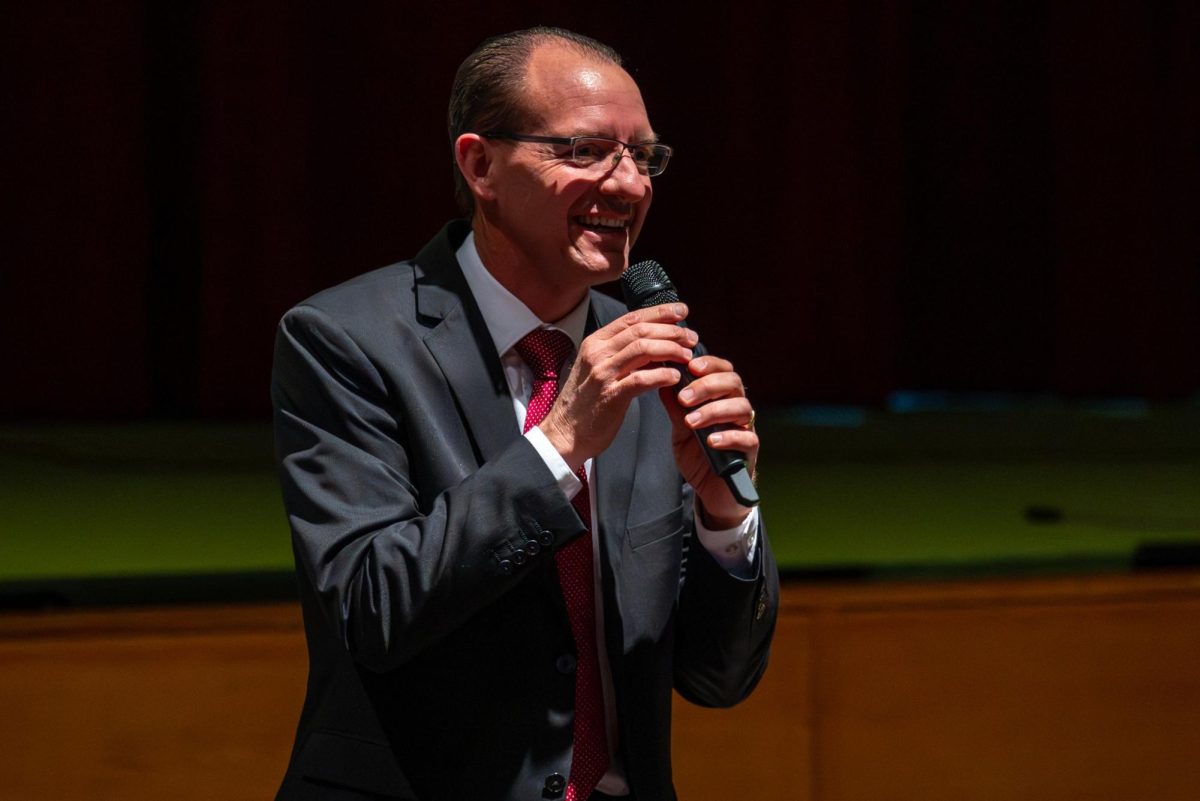
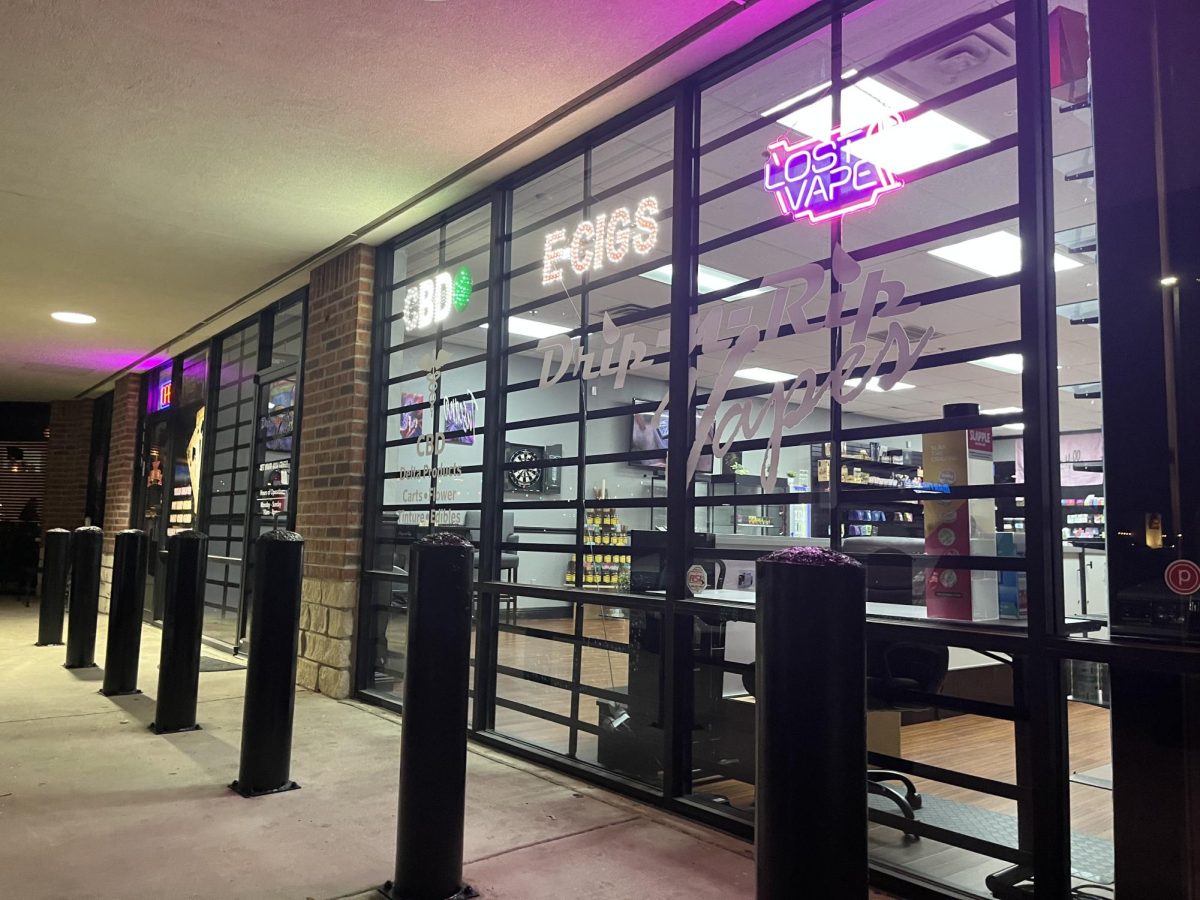

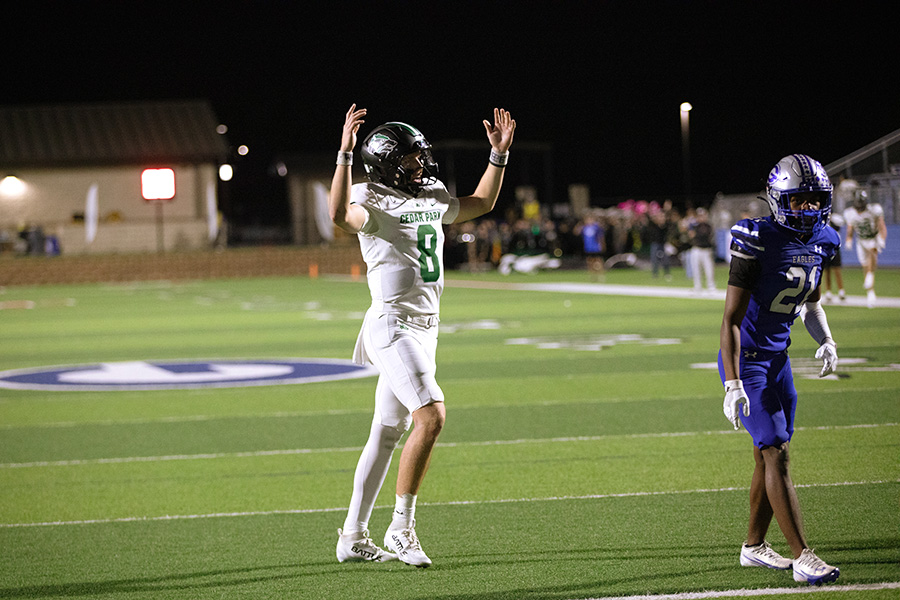

![Senior Jett Mckinney stores all the clothes in his own room, with half of it stored in his closet along with his personal clothes, and the rest taking up space in his room.
“There’s been times [when] there’s so much clothing stored here and it gets overwhelming, so I end up having to sleep somewhere else in the house,” Mckinney said.](https://cphswolfpack.com/wp-content/uploads/2025/11/DSC_0951-1200x800.jpg)



![Broadcast, yearbook and newspaper combined for 66 Interscholastic League Press Conference awards this year. Yearbook won 43, newspaper won 14 and broadcast took home nine. “I think [the ILPC awards] are a great way to give the kids some acknowledgement for all of their hard work,” newspaper and yearbook adviser Paige Hert said. “They typically spend the year covering everyone else’s big moments, so it’s really cool for them to be celebrated so many times and in so many different ways.”](https://cphswolfpack.com/wp-content/uploads/2025/05/edited-ILPC.jpg)




![Looking down at his racket, junior Hasun Nguyen hits the green tennis ball. Hasun has played tennis since he was 9 years old, and he is on the varsity team. "I feel like it’s not really appreciated in America as much, but [tennis] is a really competitive and mentally challenging sport,” Nguyen said. “I’m really level-headed and can keep my cool during a match, and that helps me play a bit better under pressure.” Photo by Kyra Cox](https://cphswolfpack.com/wp-content/uploads/2025/09/hasun.jpg)

![Bringing her arm over her head and taking a quick breath, junior Lauren Lucas swims the final laps of the 500 freestyle at the regionals swimming competition on date. Lucas broke the school’s 18-year-old record for the 500 freestyle at regionals and again at state with a time of 4:58.63. “I’d had my eye on that 500 record since my freshman year, so I was really excited to see if I could get it at regionals or districts,” Lucas said. “ State is always a really fun experience and medaling for the first time was really great. It was a very very tight race, [so] I was a bit surprised [that I medaled]. [There were] a lot of fast girls at the meet in general, [and] it was like a dogfight back and forth, back and forth.” Photo by Kaydence Wilkinson](https://cphswolfpack.com/wp-content/uploads/2025/03/Kaydence-2.7-23-edit-2.jpg)
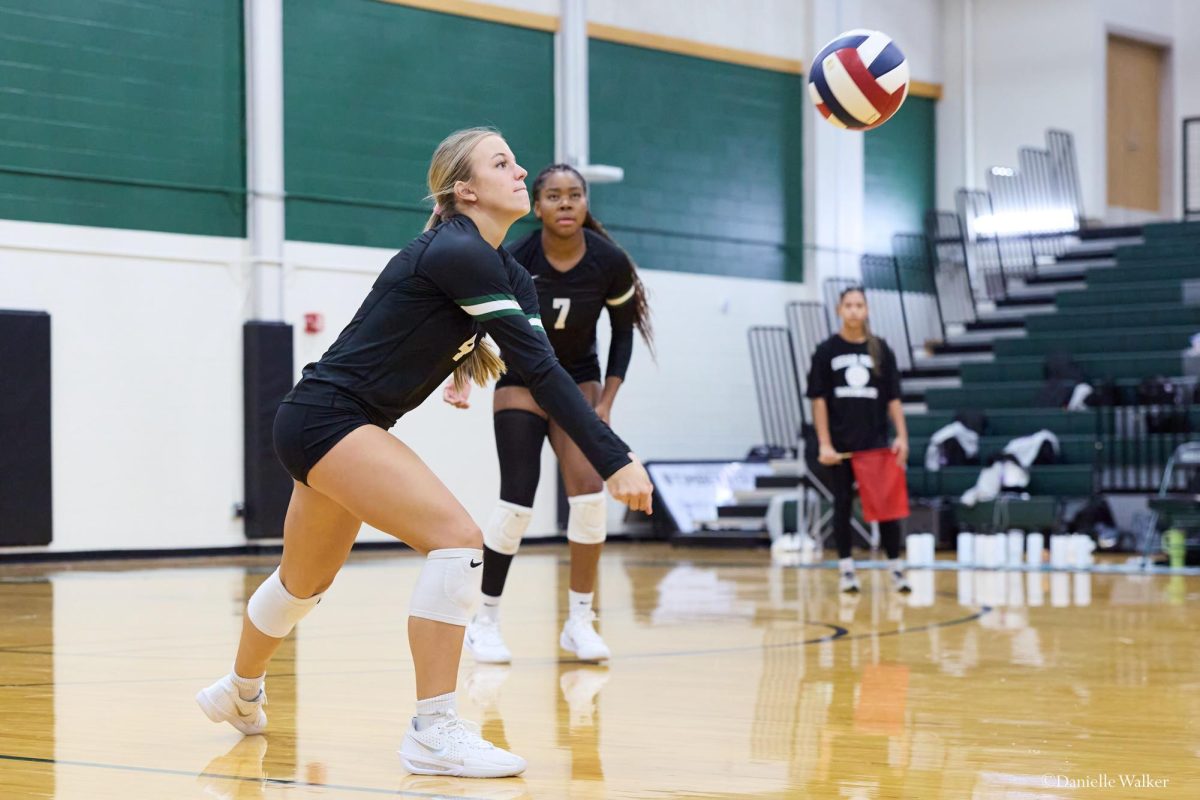

![As her hair blows in the wind, senior Brianna Grandow runs the varsity girls 5K at the cross country district meet last Thursday. Grandow finished fourth in the event and led the varsity girls to regionals with a third place placement as a team. “I’m very excited [to go to regionals],” Grandow said. “I’m excited to race in Corpus Christi, and we get to go to the beach, so that’s really awesome.” Photo by Addison Bruce](https://cphswolfpack.com/wp-content/uploads/2025/10/brianna.jpg)















